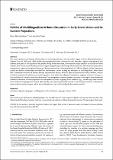Politics of multilingualism in Roma education in early Soviet Union and its current projections
Abstract
This article presents the history of the politics of multilingualism (or lack thereof) in regard to Roma (formerly known as “Gypsies”). In the 1920s and 1930s in the newly established Union of Soviet Socialist Republics, against a backdrop of proclaimed principles of full equality of all peoples living in the new state, commenced a rapid creation of schools for Roma children with instruction in Romani mother-tongue along with special training of Roma teachers. The results achieved were impressive in regard to the general literacy of Roma communities, but nevertheless in 1938 the “Gypsy schools” have been closed and Roma children were enrolled into mainstream schools lacking any elements of multilingualism. After World War II individual countries of Eastern Europe implemented various forms of special education for Roma children, neither of which however with elements of multilingualism. Only after the collapse of communist regimes in Eastern Europe, in the conditions of transition and the subsequent Euro-integration, various singular countries in the region have developed individual elements of multilingualism and educational policies targeting Roma children (e.g. introducing under various forms a Romani language instruction). Sporadically there even appeared proposals for teaching instruction conducted entirely in Roma mother-tongue, which were debated and rejected (including by Roma themselves).
Citation
Marushiakova-Popova , E A & Popov , V 2017 , ' Politics of multilingualism in Roma education in early Soviet Union and its current projections ' , Social Inclusion , vol. 5 , no. 4 , pp. 48-59 . https://doi.org/10.17645/si.v5i4.1128
Publication
Social Inclusion
Status
Peer reviewed
ISSN
2183-2803Type
Journal article
Description
This article is written as a part of the research project ‘RomaInterbellum. Roma Civic Emancipation between the Two World Wars’ which has received funding from the European Research Council (ERC) under the European Union’s Horizon 2020 research and innovation programme (grant agreement No 694656).Collections
Items in the St Andrews Research Repository are protected by copyright, with all rights reserved, unless otherwise indicated.

